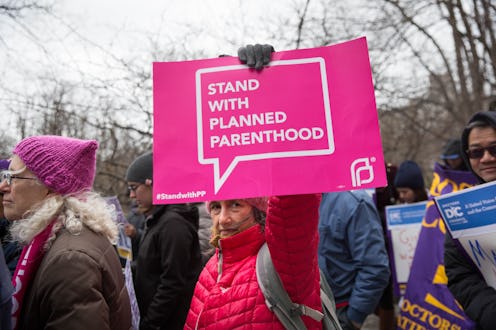News
The White House Is Conflating Birth Control With Abortion & Here's Why That's Dangerous

In October, the Trump administration rolled back Obama-era rules requiring most employers to provide contraception coverage. As it turns out, this is not the only controversial move it has made in regards to birth control. A recent report by Vox found that the White House is essentially conflating birth control with abortion when communicating with constituents, hinting at how the administration is approaching access to reproductive health care.
As Vox reported, some Americans who sent the Trump administration emails opposing the roll back of the contraception mandate have received responses that discuss abortion instead. The responses lay out why the administration believes that health care organizations should not receive federal funding if they perform abortion services, and some of them don't even mention contraception.
For example, Vox cited that case of Charissa, an alias for a woman who sent an email to the Trump administration with a direct request regarding birth control costs. Charissa told Vox that her email read: “I demand you keep birth control copay free ... Why? Because it’s absolutely critical to women’s health, equality and empowerment.”
In response, she received a lengthy email about the administration's thoughts on abortion. "Thank you for taking the time to express your views regarding abortion," the message said. "The right to life is fundamental and universal. As your President, I am dedicated to protecting the lives of every American, including the unborn. As I have made clear, organizations like Planned Parenthood should not receive Federal funding if they perform abortions ... "
The administration's response to Charissa (and others who wrote similar emails and received similar responses) unfortunately aligns with its history of providing skewed information about contraception.
For example, according to Teen Vogue, leading officials at the Department of Health and Human Services (HHS) have a reputation for promoting "junk science" regarding contraception safety and contraception's disproven linkages to abortion.
Indeed, current HHS special assistant Matthew Bowman once wrote a scathing condemnation of the employer contraception mandate in a comment on a Christian legal theory blog in 2012. Bowman indicated that employers who provide insurance coverage for contraception “kill embryos and bow to the altar of fruitless intercourse.” Vox also reported that, in 2011, Bowman wrote an article in Town Hall claiming that the contraception mandate included coverage for "several drugs or devices that cause the demise of an already conceived but not yet implanted human embryo, such as certain intrauterine devices (IUDs)." Bowman also referred to the mandate as the "the HHS abortifacient [abortion-causing] mandate.”
Bowman's logic is misguided, as Vox reported that daily birth control methods, emergency contraception, and IUDs all primarily work by inhibiting fertilization and/or ovulation — not by stopping implantation of a fertilized egg. An exception to this could be when a woman has a copper IUD inserted after intercourse, which may prevent implantation, but it is exceedingly rare. And, as the outlet reported, the American Congress of Obstetricians and Gynecologists is clear about the fact that contraception is not linked to abortion, saying, “FDA-approved contraceptive methods are not abortifacients."
White House health care policy adviser Katy Talento also once erroneously claimed in an article she wrote in 2015 for The Federalist that using contraception make it less likely that women will be able to conceive a child. As Talento wrote, "the longer you stay on the pill, the more likely you are to ruin your uterus for baby-hosting.” This information is not accurate; there is not evidence that using contraception diminishes a woman's chances of getting pregnant once she stops using it. Indeed, some studies have actually shown that women who use the pill for five or more years are actually more likely to get pregnant within six months to a year than women who did not take the pill.
Unfortunately, the Trump administration is perpetuating inaccurate rhetoric about contraception and abortion, including when communicating with constituents. This dangerous rhetoric could hint at a possible desire to even further limit women's access to contraception, which would then restrict women's reproductive freedom and lead to more unwanted pregnancies.